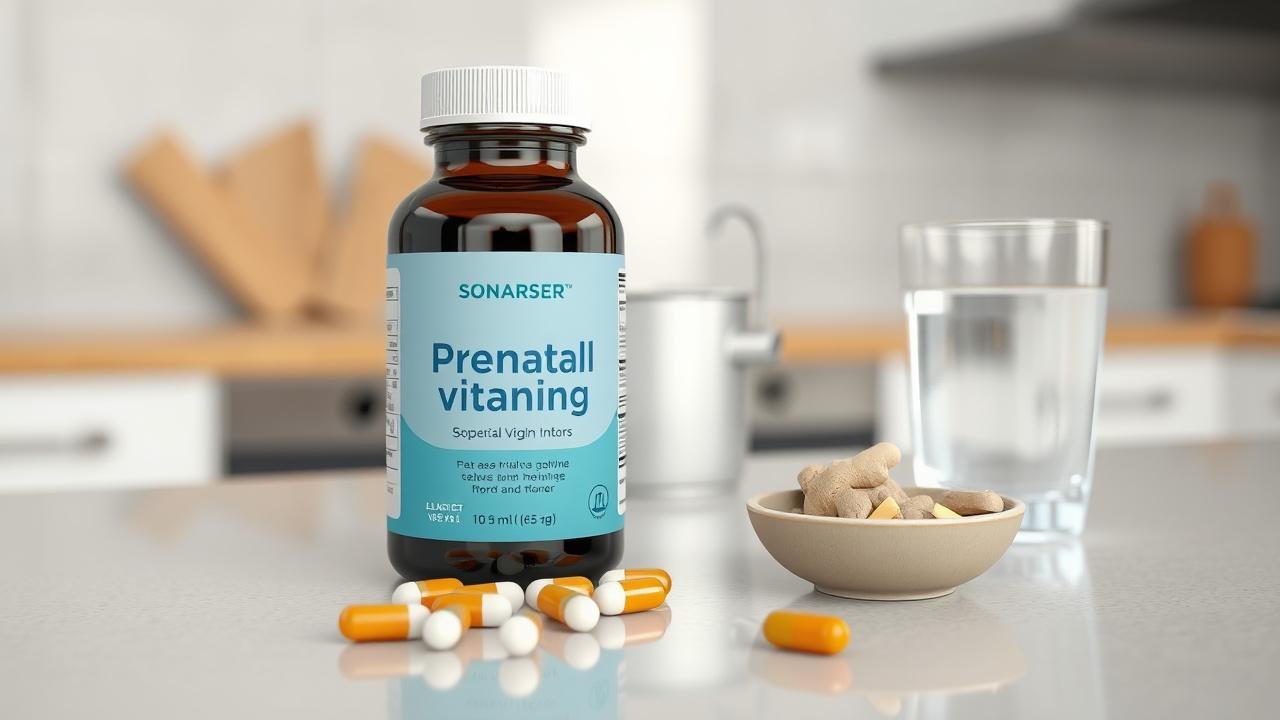Prenatal vitamins play a crucial role in supporting both your health and your baby’s development during pregnancy. Understanding why these supplements matter goes beyond just taking a daily pill—it involves knowing the key nutrients they provide, the best time to start, and how they contribute to your well-being before, during, and after pregnancy. This guide explores essential nutrients for fetal growth, addresses common myths, helps you choose the right vitamin for your needs, discusses potential side effects, and looks ahead to future research—all designed to empower you on this important journey.
The Essential Nutrients in Prenatal Vitamins and Their Role in Fetal Development
The essential nutrients in prenatal vitamins play a crucial role in supporting fetal development, laying the foundation for your baby’s growth and health. Key ingredients like folic acid help prevent neural tube defects, while iron supports oxygen transport to the developing fetus. Calcium strengthens bones and teeth, and DHA promotes brain and eye development. These vital components work synergistically to ensure your baby receives balanced nourishment during critical stages of pregnancy. Understanding these nutrients also connects naturally with other parts of the blog, such as choosing the right prenatal vitamin tailored to your unique needs or managing potential side effects safely. Starting supplementation early, as discussed in “When to Start Taking Prenatal Vitamins,” maximizes these benefits. Moreover, these nutrients don’t just support fetal health—they also contribute to maternal well-being during pregnancy and aid postpartum recovery, highlighting how prenatal vitamins serve both you and your baby throughout this transformative journey.
When to Start Taking Prenatal Vitamins for Optimal Maternal and Infant Health

Starting prenatal vitamins early, ideally before conception, is crucial for both maternal health and optimal fetal development. This timing ensures that essential nutrients like folic acid are available during the earliest stages of pregnancy, when the neural tube forms, significantly reducing the risk of birth defects. Beginning supplementation in advance also supports maternal well-being by building nutrient reserves needed throughout pregnancy, as discussed in the section on how these vitamins bolster maternal health. Delaying intake can limit benefits, highlighting why choosing the right prenatal vitamin at the right time matters. Understanding when to start connects closely to debunking myths about prenatal vitamins and managing potential side effects safely. Moreover, early and consistent use lays a foundation not just for pregnancy but also for postpartum recovery and breastfeeding support, underscoring prenatal vitamins’ role beyond gestation. Emerging research continues to refine recommendations on timing, promising even more personalized guidance in the future.
How Prenatal Vitamins Support Maternal Well-Being During Pregnancy
Prenatal vitamins play a vital role in supporting maternal well-being throughout pregnancy by ensuring the mother receives essential nutrients that may be difficult to obtain from diet alone. These supplements help maintain adequate levels of folic acid, iron, calcium, and other key vitamins that reduce fatigue, support immune function, and promote healthy blood volume. Proper maternal nutrition through prenatal vitamins also lowers risks of complications such as anemia and preeclampsia. Understanding when to start taking these supplements is crucial for maximizing benefits for both mother and baby, as discussed in the timing section of the blog. Additionally, choosing the right formulation tailored to individual health needs enhances maternal comfort and nutrient absorption. Addressing common myths can alleviate concerns about side effects, which are manageable with guidance outlined elsewhere in the post. By prioritizing maternal health via prenatal vitamins, women build a strong foundation not only for fetal development but also for postpartum recovery and breastfeeding success, connecting seamlessly with later topics in the series.
Common Myths and Misconceptions About Prenatal Vitamins Debunked

Many expectant mothers hesitate to take prenatal vitamins due to common myths that can cloud their importance. One widespread misconception is that a balanced diet alone suffices for fetal development, overlooking how prenatal vitamins provide essential nutrients—like folic acid and iron—in precise amounts critical during early pregnancy, as detailed in the section on essential nutrients. Another myth suggests prenatal vitamins cause harmful side effects; however, when chosen carefully and managed properly, as explained in our guidance on side effects and vitamin selection, these supplements are generally safe and beneficial. Some believe it’s unnecessary to start taking them before pregnancy begins, yet beginning early optimizes both maternal well-being and infant health. Debunking these misunderstandings empowers women to embrace prenatal vitamins confidently, linking closely with insights on postpartum recovery and evolving research trends that continually refine recommendations for best outcomes.
Choosing the Right Prenatal Vitamin: Factors to Consider for Your Unique Needs
Selecting the right prenatal vitamin is a crucial step tailored to your individual health profile and pregnancy needs. Factors such as existing nutritional deficiencies, dietary preferences, allergies, and any underlying medical conditions influence this choice. For example, understanding the essential nutrients in prenatal vitamins and their specific roles in fetal development helps you identify supplements that provide adequate folic acid, iron, and DHA. Timing also matters—knowing when to start taking these vitamins ensures maximum benefit for both maternal well-being and infant health. Additionally, considering potential side effects and how to manage them safely can guide you toward formulations with gentle ingredients or alternative delivery methods. This personalized approach not only supports your unique pregnancy journey but also aligns with evolving research trends highlighted later in the blog. Ultimately, choosing the right prenatal vitamin connects closely with postpartum recovery strategies and breastfeeding support, emphasizing comprehensive care beyond pregnancy itself.
Potential Side Effects of Prenatal Vitamins and How to Manage Them Safely

While prenatal vitamins are vital for fetal development and maternal health, as detailed in sections covering essential nutrients and maternal well-being, they can sometimes cause side effects that require attention. Common issues include nausea, constipation, or mild stomach upset, often linked to iron or folic acid content. Managing these effects safely involves strategies like taking vitamins with food or before bedtime. Consulting a healthcare provider can also help tailor the choice of prenatal vitamin, aligning with insights from the section on selecting supplements for individual needs. Understanding these potential reactions ensures consistent use, supporting optimal infant health as emphasized in timing guidelines. Moreover, addressing side effects contributes to smoother postpartum recovery and breastfeeding support since nutrient intake remains uninterrupted. Recognizing and managing these challenges bridges knowledge from myths debunked about prenatal vitamins and reflects evolving research trends focused on improving tolerance and efficacy for expecting mothers.
The Role of Prenatal Vitamins in Postpartum Recovery and Breastfeeding Support
Prenatal vitamins play a crucial role beyond pregnancy, significantly aiding postpartum recovery and breastfeeding support. After childbirth, the body needs replenishment of vital nutrients to heal and regain strength, making continued supplementation essential. Nutrients like iron, calcium, and vitamins D and B complex help combat postpartum fatigue, support bone health, and maintain energy levels for new mothers. This continuation ties closely to the essential nutrients highlighted earlier in the blog that contribute not only to fetal development but also maternal well-being during pregnancy and beyond. Additionally, adequate nutrition supports breast milk quality and supply, ensuring infants receive necessary nourishment during early life stages. Understanding when to start and how long to continue prenatal vitamins becomes critical here. This section bridges prenatal care with ongoing maternal health strategies while addressing myths about vitamin use postpartum covered elsewhere in the blog. It underscores how choosing the right formulation can optimize recovery while supporting breastfeeding demands naturally.
Future Trends and Advances in Prenatal Vitamin Research and Recommendations
As research evolves, prenatal vitamins continue to adapt, offering more personalized and effective support for both mother and baby. Emerging insights promise improved formulations that align with individual health profiles and changing nutritional science. This ongoing progress complements everything from fetal development to postpartum recovery, enriching the journey through pregnancy and beyond. At MomDadDispatch.com, we understand how vital these advancements are in empowering families with knowledge and care during such a transformative time.






